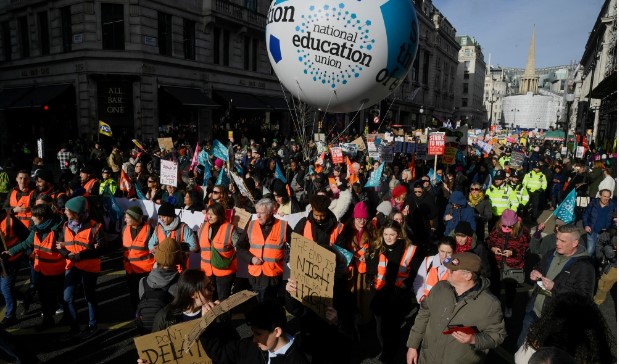At London’s King’s Cross rail station, Kate Lewis, a 50-year-old charity worker, said she sympathised with the strikers despite her train being delayed.
“I understand. We are all in the same boat. All impacted by inflation,” she said.
But government and company bosses are standing firm over wage demands.
With thousands of schools closed for the day, Education Minister Gillian Keegan told Times Radio she was “disappointed” teachers had walked out.
Union boss Mark Serwotka said the government’s position was “unsustainable”.
“It’s not feasible that they can sit back with this unprecedented amount of industrial action growing, because it’s half a million today,” he told Sky News.
“Next week, we have paramedics, and we have nurses, then will then be the firefighters,” he added, warning that unions were prepared to strike throughout the summer.
“Nothing would give me more pleasure than, to wave a magic wand and have all of you paid lots more,” British Prime Minister Rishi Sunak told public health workers on Monday.
“An important part of us getting a grip of inflation and halving it is making sure the government’s responsible with its borrowing,” he said.
READ MORE: Amazon Warehouse Workers Stage First-Ever Strike In UK
“If that gets out of control that makes it worse and it’s about making pay settlements reasonable and fair,” Sunak added.
The latest official data shows 1.6 million working days were lost from June-November last year because of strikes — the highest six-month total in more than three decades — according to the Office for National Statistics (ONS).
A total of 467,000 working days were lost to walkouts in November alone, the highest level since 2011, the ONS added.
Alongside the strikes, unions are also staging rallies across the country against the Conservative government’s plans to legislate against public sector strike action.
Organised by the TUC, the nationwide protests will insist that “the right to strike is a fundamental British liberty”, said the group’s General Secretary Paul Nowak.
Sunak has introduced a draft law requiring some frontline workers to maintain a minimum level of service during walkouts.
The prime minister has defended the plans as “reasonable” and in line with other European countries.









